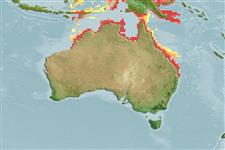>
Carangaria/misc (Various families in series Carangaria) >
Polynemidae (Threadfins)
Etymology: Polydactylus: Greek, poly = a lot of + greek, daktylos = finger (Ref. 45335).
More on author: Günther.
Environment: milieu / climate zone / depth range / distribution range
экология
морской; пресноводный; солоноватоводный демерсальный; катадромный (Ref. 51243); пределы глубины 0 - 6 m (Ref. 57343). Tropical; 5°S - 28°S, 121°E - 154°E (Ref. 57343)
Indo-West Pacific: southern New Guinea and northern Australia.
Size / Вес / Возраст
Maturity: Lm ? range ? - ? cm
Max length : 170 cm FL самец/пол неопределен; (Ref. 6390); common length : 48.0 cm FL самец/пол неопределен; (Ref. 9685); наибольший вес (опубликованные данные): 45.0 kg (Ref. 9685); наибольший возраст (опубликованны данные): 20 годы (Ref. 6390)
Body without spots nor stripes. Pectoral fin rays unbranched; 4th pectoral filament long, 40-53% of SL. Second spine of dorsal fin more robust than the rest. Posterior margin of maxilla extending considerably beyond level of posterior margin of adipose eyelid. Lower tip of 7th proximal pterygiophore of 1st dorsal fin directed backward. Lateral squamation on caudal fin unbranched (Ref. 40970).
Found in shallow, turbid waters coastal waters, estuaries, mangrove creeks, and mangrove-lined rivers (Ref. 57343), over sandbanks and mud substrates (Ref. 6390). Usually forms loose schools, although larger fish are more often observed in pairs or singly (Ref. 6390). Feeds on prawns and fish. Protandrous hermaphrodites.
Life cycle and mating behavior
Maturities | размножение | Spawnings | Egg(s) | Fecundities | личинки
King threadfin between 70 cm and 100 cm FL may be transitional hermaphrodites (they possess mature male and immature female reproductive tissue, and function as males (Ref. 28736)). However, most king threadfin less than 80 cm FL are males and most more than 95 cm FL are females (Ref. 28737). Transitional king threadfin are most often found in the months of June, July, August and September (Ref. 6390).
There is little information on the larvae, although nursery areas are known to be inshore, shallow and of low salinity (Ref. 6390).
Motomura, H., 2004. Threadfins of the world (Family Polynemidae). An annotated and illustrated catalogue of polynemid species known to date. FAO Spec. Cat. Fish. Purp. Rome: FAO. 3:117 p. (Ref. 57343)
Статус Красного Списка МСОП (Ref. 130435)
Угроза для людей
Harmless
Использование человеком
рыболовство: коммерческий; объект спортивного рыболовства: да
дополнительная информация
инструменты
Специальные отчеты
Скачать в формате XML
ресурсы в Интернет
Estimates based on models
Preferred temperature (Ref.
123201): 24.8 - 28.9, mean 28 °C (based on 575 cells).
Phylogenetic diversity index (Ref.
82804): PD
50 = 0.5000 [Uniqueness, from 0.5 = low to 2.0 = high].
Bayesian length-weight: a=0.00676 (0.00311 - 0.01469), b=3.10 (2.93 - 3.27), in cm total length, based on LWR estimates for this Genus-body shape (Ref.
93245).
Trophic level (Ref.
69278): 4.0 ±0.4 se; based on diet studies.
Generation time: 7.3 ( na - na) years. Estimated as median ln(3)/K based on 1
growth studies.
устойчивость к внешним воздействиям (Ref.
120179): низкий, минимальное время удвоения популяции 4.5-14 лет (tmax=20).
Fishing Vulnerability (Ref.
59153): High to very high vulnerability (66 of 100).
